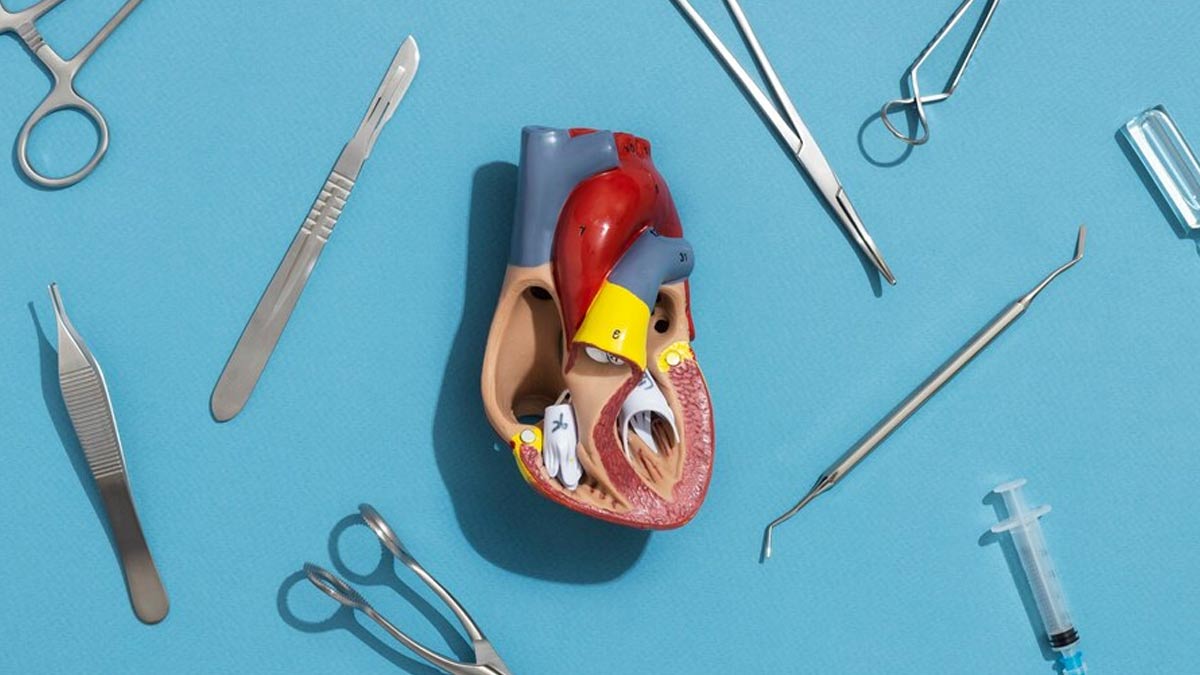
When it comes to heart surgery, the terms 'heart bypass' and 'open-heart surgery' can often be confusing and are sometimes used interchangeably. However, they refer to different procedures with unique purposes and scopes. If you're grappling with the intricacies of these terms, you're not alone. We spoke to our expert Dr Zeeshan Mansuri, Consultant- Interventional Cardiology, MBBS, MD Medicine, DM Cardiology, Shalby Hospital, SG Highway, Ahmedabad, who shed light on these two commonly misunderstood procedures: heart bypass surgery and open-heart surgery.
Table of Content:-
Heart Bypass Surgery

“Heart bypass surgery, also known as Coronary Artery Bypass Grafting (CABG), is a specific type of open-heart surgery. It aims to improve blood flow to the heart by creating new pathways around blocked or narrowed coronary arteries,” said Dr Mansuri. During the surgery, a blood vessel from another part of the body, usually the leg, arm, or chest is grafted onto the blocked artery to create a new pathway for blood to flow, effectively ‘bypassing’ the obstruction.
How It Works
During CABG, surgeons create a new route for blood to bypass the blocked coronary arteries. To do this, they take a healthy blood vessel from another part of the body, commonly from the leg (saphenous vein), arm (radial artery), or chest (internal mammary artery). “This vessel, known as a graft, is attached to the blocked artery, forming a new channel for blood flow. This rerouting helps to alleviate chest pain (angina), reduce the risk of heart attacks, and improve overall heart function,” added Dr Mansuri.
Also Read: Exercising In The Morning Can Ease Insomnia and Sleep Issues After Heart Bypass Surgery
According to the British Heart Foundation, heart bypass surgery is generally safer than ever before, but like any surgicalprocedure, it carries some risks and puts the body under stress. The likelihood of complications can vary based on several factors, including your overall health before the surgery. For instance, around 10% of patients might experience significant memory loss post-surgery, although most will recover fully.
Additionally, approximately one-third of patients may face reduced kidney function, which typically improves within days after the operation.
Major complications, such as stroke, have a general risk of 1-2%. Your doctor can provide personalised insights into your risks and help you understand what to expect.
Open Heart Surgery
.jpg)
Conversely, the more general phrase Open-Heart Surgery refers to any surgical operation in which the chest is opened and the muscles, valves, or arteries of the heart are operated on. “Along with bypass surgery, this may involve treatments to cure an aneurysm, fix congenital cardiac problems, or replace heart valves. A heart-lung machine (cardiopulmonary bypass) is used in open-heart surgery to replace the heart and lungs during the operation temporarily,” explained Dr Mansuri.
According to a 2024 study, while heart bypass surgery offers long-term benefits, it is not without risks. Reports indicate a 2–3% mortality rate within 30 days and an approximate 6% mortality rate within a year after the procedure. Common complications following the surgery include heart rhythm disturbances, delirium, and Postoperative Pulmonary Complications (PPCs).
Also Read: Heart Attacks and Blood Pressure: Expert Explains Blood Pressure Changes During a Heart Attack
Choosing the Right Procedure

Selecting between heart bypass surgery and other forms of open-heart surgery involves several factors. The decision is based on the patient's specific cardiac condition, overall health, and treatment goals.
Factors to Consider
- Type of Cardiac Condition: The specific heart issue dictates whether CABG or another form of open-heart surgery is appropriate.
- Patient’s Overall Health: Other medical conditions and overall fitness influence the choice of procedure.
- Surgeon’s Expertise: Recommendations from experienced cardiologists and surgeons play a crucial role in determining the best approach.
[Disclaimer: This article contains information provided by an expert and is for informational purposes only. Hence, we advise you to consult your own professional if you are dealing with any health issues to avoid complications.]
Also watch this video
How we keep this article up to date:
We work with experts and keep a close eye on the latest in health and wellness. Whenever there is a new research or helpful information, we update our articles with accurate and useful advice.
Current Version